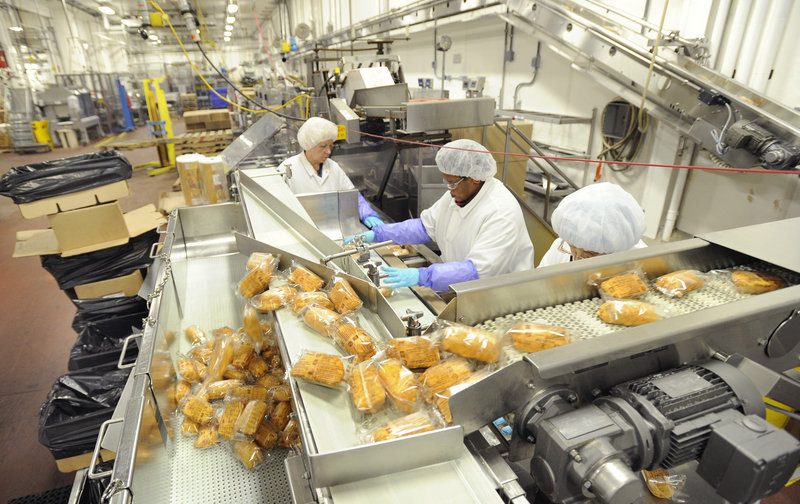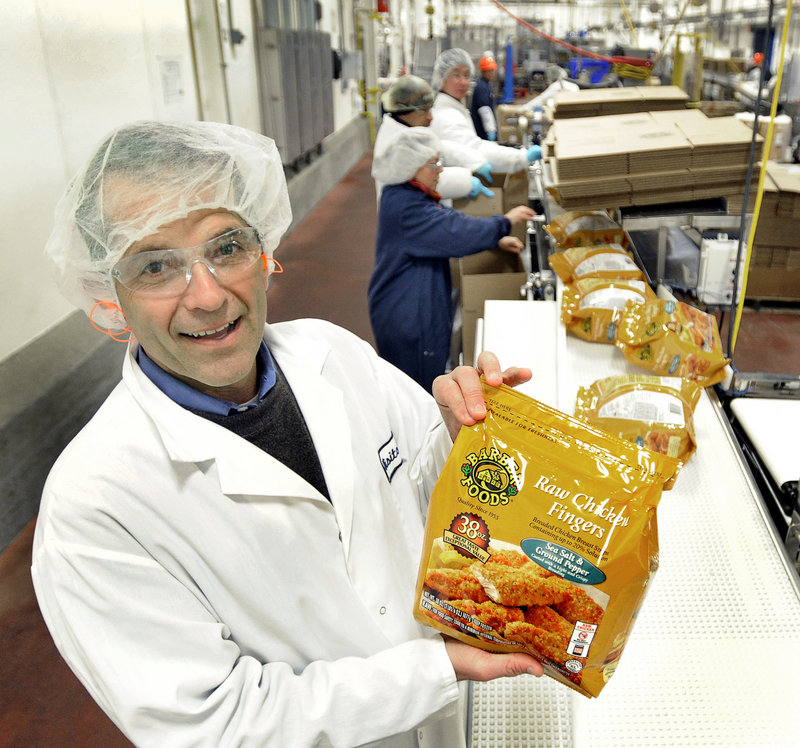PORTLAND – Inside the St. John Street production plant of Barber Foods, the hum of fans and the drone of machinery drown out the voices of workers. The air is cold and fresh smelling. The floor, spotless.
And the production line is running full bore.
From here, the Portland-based company, launched 55 years ago from the back of a truck, cooks up 900,000 pounds of frozen prepared food every week, fighting for market share in the $31.7 billion frozen food industry and the roughly $20 billion food service industry. Barber competes with such mega corporations as Tyson Foods, Perdue and ConAgra Foods.
“We are all seeking a share of the stomach,” said David Barber, executive vice president and son of founder Augustus “Gus” Barber.
But despite the stiff competition and the impact of two years of the recession, Barber Foods is still projecting modest growth over the next several years. Barber attributes the company’s longevity and strong sales to strong relationships with buyers, a focus on the well-being of employees and reputation for quality, consistency and food safety.
“When (customers) open up the package, they know what they are going to find. It is not going to be a surprise,” Barber said.
On a recent tour of the bustling production plant, Barber pointed out the high-tech fryers, freezers and conveyors that bring efficiency to the plant. But, he noted, employees play an even bigger role — they keep watch over the machines, and, more importantly, ensure the quality of the finished product.
Staffers in white coats were everywhere. Some hurriedly wheeled carts of Barber packages across the production floor. Others stood alongside the production line, checking each chicken cutlet moving past.
Here is where chicken nuggets are made, said Barber, sweeping his arm toward an automated production line stretching across the 85,000-square-foot production room.
EMPLOYEES CHECK EACH STEP
At the start of the line, a slow-turning roller drops raw chicken fillets into breadcrumbs. A conveyor belt carries the chicken at walking speed to a vat of hot oil.
From there, it’s moved into a freezer. The last stop is the “multi-head weigher,” where chicken breasts drop, one at a time, into metal buckets. When the buckets reach the desired weight, they open from the bottom, filling Barber-branded bags.
The process is highly automated, but employees observe every step, tossing out what’s unwanted and ensuring a smooth operation. Electronic scanners and cameras monitor and adjust the lines.
“We take a picture of every box to make sure it is in the right lot,” said Barber. “It might be a broccoli and cheese box, but is supposed to be cordon bleu.”
The company makes a variety of chicken dishes here, from Chicken Kiev to Parmesan Chicken, fingers to nuggets. Many specialty products are chicken breasts stuffed with broccoli, asparagus, cheese — or even scallops and lobster.
Not far from the production line is a quality-assurance lab, a test kitchen and a dining room, where half a dozen staffers sat around a large table last week.
TASTE TESTERS HAVE THEIR SAY
A chef in a white uniform emerged from the kitchen with a tray of piping-hot chicken-pot-pie-filled chicken breasts — a product the company is testing.
The chef placed the tray at the head of the table, cut each breast into quarters and passed them around the table on small plates. Each piece oozed rich gravy and vegetables. Some had chunks of potato.
The tasters each had a bite, and an argument ensued over which was better. One taster was adamant — the potatoes made the dish excellent, he said.
Another taster was just glad to be part of the tasting team. “I want to come back next week,” he told Barber with a laugh and a smile.
Barber said the company tests new products roughly once a month with employees, hired product testers and consumers. Barber products are often tested against competing products.
Every day, employees taste food that Barber packaged the day before, which ensures quality remains high.
The company ships products locally to stores like Hannaford, and nationwide to regional supermarket chains and major retailers like Walmart and Sam’s Club. The company’s food-service division supplies hospitals, colleges and universities, hotels, restaurants and the U.S. military.
Barber said the company strives for environmental sustainability. Barber Foods has onsite water treatment, scrubs oil and grease from its emissions and composts organic waste.
Used fryer oil is shipped to Maine Standard Biofuels, which converts the liquid into biodiesel and ships it back to Barber. The company burns the fuel for heat in winter, which Barber said results in significant savings.
ABOUT 700 EMPLOYED
Barber Foods has some 700 workers, including a team of 60 maintenance staff who keep the company’s equipment tuned.
Though David Barber declined to discuss the company’s revenue, CEO Bruce Wagner told Mainebiz in 2009 that revenue is more than $100 million.
Barber said the recession has been hard on the company. As the economy tanked, consumers “traded down,” and the company lost market share as people moved from chicken to cheaper items like macaroni and cheese. At the same time, rising materials costs pressured margins. Barber said the company laid off roughly 20 staffers at the time.
Though the recession has eased, challenges remain.
Barber called health care costs concerning, though he said the company kept expenses flat in the last year thanks to a program encouraging employees to participate in wellness programs.
Another concern is supermarket consolidation.
Barber said in recent years many stores have been bought by major corporations like Kroger and Supervalue, making Barber Foods more dependent on sales to enormous buyers. A lost client today can seriously hurt the bottom line.
David Barber also worries about ethanol, a renewable fuel made from corn.
In October, the Environmental Protection Agency approved a measure to allow gas retailers sell petrol containing up to 15 percent ethanol, up from 10 percent.
But ethanol comes from corn, and more demand might mean higher prices for chicken feed and other products.
Uncertainties aside, Barber said the company is well-positioned. Sales are strong and the plant is running flat out.
“We are projecting growth for three years. Modest but solid growth,” he said.
Jonathan Hemmerdinger can be reached at 791-6316 or:
jhemmerdinger@mainetoday.com
Send questions/comments to the editors.




Success. Please wait for the page to reload. If the page does not reload within 5 seconds, please refresh the page.
Enter your email and password to access comments.
Hi, to comment on stories you must . This profile is in addition to your subscription and website login.
Already have a commenting profile? .
Invalid username/password.
Please check your email to confirm and complete your registration.
Only subscribers are eligible to post comments. Please subscribe or login first for digital access. Here’s why.
Use the form below to reset your password. When you've submitted your account email, we will send an email with a reset code.